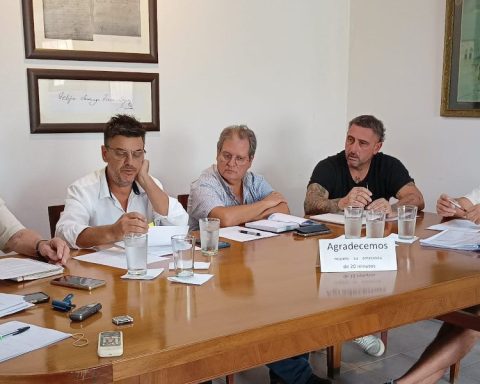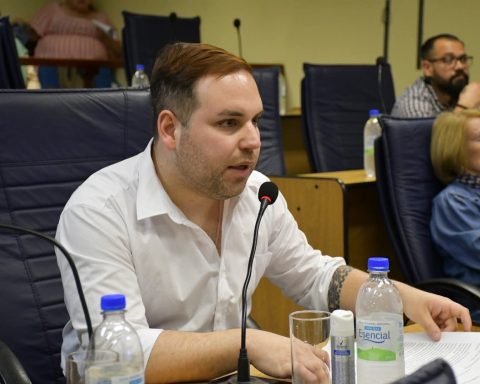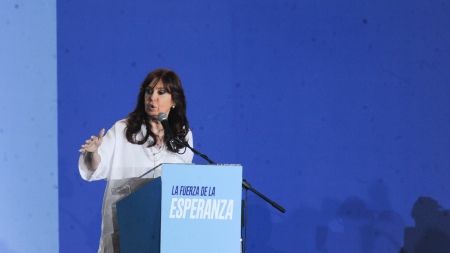The deadline is set. If before the end of the year there is no satisfactory solution to their claims, Cabildo Abierto will embark on a signature campaign to constitutionally consecrate their proposal to restructure the debts of individuals. A project that failed in the Senate, after reaching the plenary with certain votes, but which ended up being suddenly stopped due to the “doubts” it generated in various legislators. Several of them in the government coalition itself.
The fact generated deep annoyance in lobbyists who publicly came out to blame the opposition with which they had negotiated part of the articles. Also, quietly, to his nationalist partners in the government coalition who ended up blocking the way for his intentions.
The whites, in turn, began to talk about the impact that a collection of signatures –carried out by one of their partners for a project rejected by the Executive Branch– can have on the electoral front. Several nationalist senators, meeting this Wednesday, discussed the issue. “They don’t know what it’s like to go out and collect signatures,” said one of them.
In Cabildo Abierto they understand the challenge, and for that they prepare. It would be the first time that they face a collection of signatures as a party. The chosen format involves first obtaining the support of 10% of those registered that lead to a plebiscite simultaneously with the 2024 elections. The campaign would begin after Easter, he told The Observer Senator Guillermo Domenech.
As a preparation, he said, the lobbyists will base themselves on previous experiences of similar campaigns. There the reference seems inescapable. The main mirror in which the Cabildo Abierto will see itself will be the Broad Front. This was recognized by Domenech himself. “We might even check with them”advancement.
Those led by Manini rule out any electoral intention in this action. Beyond that, as Domenech recognized, the coincidence of the possible plebiscite with the next national elections will inevitably mix both objectives. The senator admits that it is possible that his party could capture more votes with his popular consultation proposal.
“Hopefully people will realize that this is in their defense.”
Deputy Martín Sodano, for his part, took it for granted that once the campaign advanced, other parties – which today reject the Cabildo project – would end up joining due to electoral interest. He also challenged his associates who doubt the success of the campaign and the mobilization capacity of his party. “Do not underestimate the Cabildo Abierto”, claimed. “Let’s all go out into the street.”
Target population
What the council is looking for is that the Constitution establishes the maximum interest that lenders can charge. Also modify the way they are calculated.
The target population of the campaign is broad. Some 980 thousand Uruguayans they maintain a negative report in the Clearing of Reports due to some type of non-compliance in the payment of their responsibilities. In the Central Bank (BCU) 633 thousand are registered as “irrecoverable debtors”.
The project had been approved in a Senate committee but was later stopped in full session of the chamber -before a series of “doubts” raised in the government coalition itself-, which annoyed the lobbyists, who will now make one last bet on the legislative way. They will do so with the premise that the essence of the project must remain unchanged, which creates a mechanism to restructure debts and thus make them “reasonable”, with an acceptable result for debtors and creditors. The slowdown allowed them to have a new tool.
Cabildo Abierto opened in July a center of attention for the people “plundered” by the lenders who, up to now, managed to collect some 600 testimonials. This was indicated to El Observador by deputy Sodano, in charge of the activity. Part of them, said the legislator, will be taken to Parliament to “put a face” on this problem and demonstrate that “they are not hypotheses, they are real cases.”
Among the people who went there for help there is everything: public and private employees, retirees, said the deputy. As potential beneficiaries, the bill foresees debtors whose assets and annual income do not exceed 120,000 indexed units, equivalent today to $56,000 per month.
Cabildo is also based on figures from the Central Bank to affirm that Uruguayan families are paying around US$ 5,000 million per year in interest on loans. They reason there that, if the national wage bill is around US$ 19,000 million, Uruguayans pay a quarter of their income per year for this concept alone.
After a few months of increase, the delinquency level stabilized, although at the end of this year a negative impact is projected due to the increase in the levels of allowances for bad loans. This was indicated by the Consumer Credit Market Monitor of the financial institution Pronto, corresponding to September.
The last quarterly survey, carried out among 1,200 people, indicated that 60% maintained some type of debt. Only 45% said they believed that if they asked for a loan, they would grant it. 51% said they had some difficulty in covering their payments in the last four-month period. As destination of the contracted loans, 46% said that it was to pay bills, 31% to fix their house, and 16% to buy groceries, adds the Monitor.
According to this measurement, consumer credit closed in August with a total of US$ 8,311 million. This is a volume 5.2% higher than that of the same month















